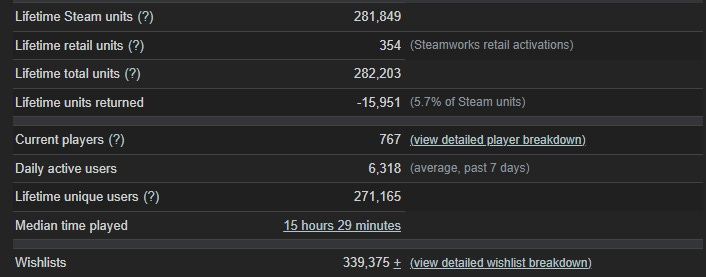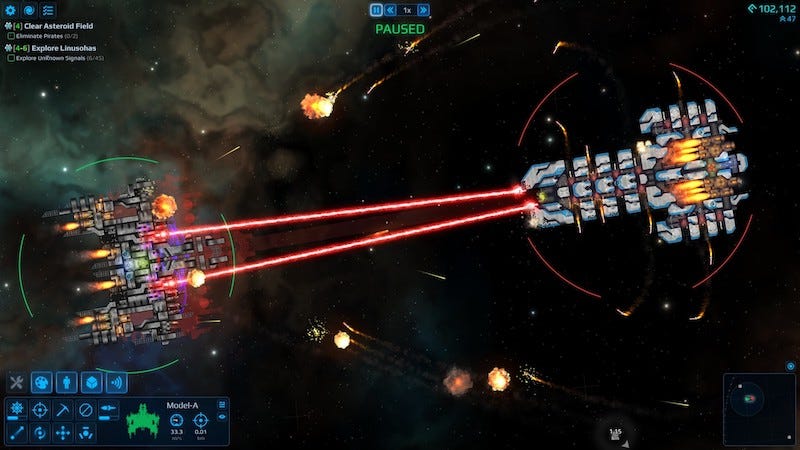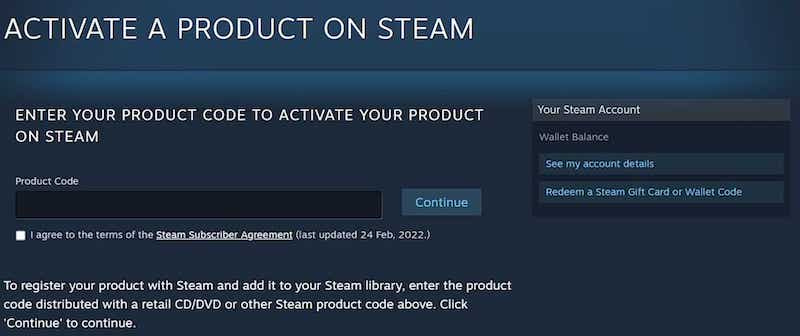Deep dive: how Cosmoteer became a breakout Steam hit
Lots of numbers attached! Also: a follow-up on Steam keys & more.
[The GameDiscoverCo game discovery newsletter is written by ‘how people find your game’ expert & company founder Simon Carless, and is a regular look at how people discover and buy video games in the 2020s.]
We’re back, y’all, and we couldn’t be happier. Why? We have some really strong articles coming up over the next week or two, with plenty of data and insight from the wonderful world of game discovery. So let’s get things going!
Oh, and before we do, a request: we’re looking for PC/console ‘games as a service’ titles (at least 10k DAU!) to interview. You don’t have to spill your full metrics - we just want to talk about update cadence, community strategy, etc. Ping us if interested!
[On this fine Monday, support us via a GameDiscoverCo Plus paid subscription. You’ll get our an extra data-rich weekly PC/console game trend analysis newsletter, an interactive Steam ‘Hype’ chart back-end, two ‘how to’ eBooks, a member-only Discord & more. Sign up today.]
Cosmoteer: the data behind a big solo Steam hit!
One thing we find fascinating about the video game business vs. other creative industries? Solo devs can - on occasion - have massive organic success, all accomplished without publishers, external funding or massive marketing budgets.
We all know the Stardew Valley-s of this world, of course. And looks like Walt Destler’s ‘starship architect & commander’ sim Cosmoteer, launched last October, is the latest - more PC-centric - title to add to this list of ‘solo dev, spectacular results’.
A few weeks ago, we had a chance to catch up with Walt. And firstly, he was kind enough to offer us his Steam back end stats, as of the beginning of February 2023:
So that’s almost a) 300,000 units sold at $20 in just over 3 months, b) a blisteringly high play median of 15 hours+ (wow!), and c) only 5.7% refunds, very low for an Early Access title of this kind. We’d expect this game to sell 1 million+ units over time.
But how did we get to this point, besides the game being, uh, great? (It is!) Here’s key quotes from our interview with Walt, alongside internal stats & videos from the game:
The length of Cosmoteer’s development stands out
“I made the original prototype of Cosmoteer (then simply called ‘Ship Builder’) way back in early 2011. So if you start counting from then, I've been working on Cosmoteer for 12 years (though only part-time for most of that)!
When I started, there were virtually no build-your-own-spaceship games. Captain Forever was the only one I knew about, and household names like FTL, Kerbal Space Program, and Space Engineers hadn't been released yet.”
The game’s ‘hook’? A crew to manage within the spaceship
“The biggest feature that I think has helped Cosmoteer stand out from other spaceship-building games is its crew simulation. Each crewmember on your ship is individually simulated, as they run around operating systems and carrying ammunition and power batteries.
This makes you, the player, have to think about how your design your ship's interior floor plan to maximize its efficiency. How often a cannon can shoot - or how long a shield can stay up - depends directly on how quickly your crew can deliver ammo and power.”
Dev transparency created a big potential audience
“From the very first prototype, I made builds of Cosmoteer free for anyone to download and play. Getting that feedback, bug reports, and support was extraordinarily valuable… there's no way I would've even had the motivation to keep working on it for so long without the community's continued enthusiasm and encouragement.
Eventually I stopped releasing the free feature updates, so that I could concentrate on the paid Steam release. This would be a massive upgrade with completely new graphics and an overhauled main ‘career’ mode.
Without a doubt, the decision to develop Cosmoteer for years in the open while building a community was a massive success. It might not be the right approach for every game, but for the right kind of game, I would absolutely do it again.”
Cosmoteer decided not to use a publisher, despite much interest…
“I talked to probably a couple dozen publishers, asking for help with the normal things like marketing, QA, and localization. I received offers from many of them and very, very seriously considered several of those offers.
But after getting advice from other devs and industry experts, I ultimately decided to self-publish Cosmoteer. Cosmoteer had already earned a lot of attention without a publisher's help, so it was certainly clear that I didn't need a publisher.
And none of the publishers I had offers from were able to convincingly prove that they could somehow increase the market for Cosmoteer beyond what it had already earned…”
So what did Cosmoteer do right, and what’s next for it?
What happened next, and what can we learn from this whole success story? It’s tempting to say ‘1 game in 10,000 is a massive hit, and you can’t predict that, and this is just one of those!’ But no, Walt intentionally did some very correct things:
He built an incredibly complex - but fun - sandbox-y game: graphics be damned, PC players love intelligent complexity, and Cosmoteer encapsulates that. Like a giant Lego set, you can build out outlandish ships & roam the galaxy, and yes, you can play co-op with friends, another key seller in today’s market.
He waited to monetize until he’d built up a really deep feature set: when I first talked to Walt about it, I was a little astounded he hadn’t tried to sell the game yet. (You can argue his current success is - to some extent - collecting $ that he could have grabbed years ago.) But waiting made for a bigger splash, it turns out.
Though he didn’t use a publisher, he still marketed the game: in addition to all the community work, Vicarious PR worked with Walt leading up to launch. This helped him get PC Gamer pieces and re-appear on Splattercat’s channel, for example. (As well as appearing in Steam showcases like Next Fest and TactiCon.)
So in the end, Cosmoteer launched with 144,000 Steam wishlists - and around 20,000 Steam followers, interestingly. This is a low ‘follower to wishlist’ ratio of around 7x. Not saying high multiples are always bad, but ‘low multiple’ games seem to be an indication of a committed core fanbase wanting to read news updates on the game.
From there? Cosmoteer sold 74k units in the first week - an 0.5x ‘launch wishlists to first week sales’ ratio, which is about 2.5x normal. In addition, its long tail is very notable. Many games are front-loaded, and its daily sales are… absolutely not:
While sales certainly go down post-launch, Cosmoteer took about 6 weeks to reach 1-2,000 units per day, about 10% of launch day sales. This is great. (Some titles are already down to 1-2% of launch day unit sales by a couple of weeks after launch.)
And there’s plenty of extra sales to pull the trigger on later. (Heck, the above holiday 2022 sales spike was for a 10% discount, which didn’t even trigger an email to the 340k outstanding Steam wishlisters.) So really, this is just the start of the story…
Follow-up: the ‘new’ Steam key policies, discussed
So, the newsletter we put out last week analyzing Steam’s public changes to its Steam key redemption FAQ caused some hum. In general, we did mention Valve’s webpage changes were more ‘detailing existing policy’, rather than making brand new rules.
But here’s the extra commentary and nuance we received after the article that we wanted to relay on to y’all:
Non-top selling Steam games already had issues getting big key requests approved: in the last year or two, small devs have certainly been getting their ‘very large’ key requests rejected. So this policy of querying “a game with a few hundred units of lifetime sales requesting tens of thousands of keys” was already in place. It just wasn’t so public (or quite so enforced?) until now.
Even if you’ve signed a deal for the keys, Valve doesn’t have to give them over: This is bolded in the new FAQs: “Please note: your commitment to a deal to sell or distribute Steam Keys before you have received keys or approval does not obligate Valve to provide keys. We’re always happy to review your request for Steam keys in advance..”
Valve will often try to get devs to reclaim unused keys: there’s a section in Steam’s FAQ that notes “the total number of keys that have been issued and activated for the game” is a factor. So even if you come with a small key request and you have a large amount of unredeemed keys, Valve may ask you to use some of those. (So you will want to have a way to get unused keys back from bundle partners.)
Did you know that you can give out individual Steam Playtest keys? OK, this is more of a granular point, but a lot of people are under the impression Steam Playtest only works with the ‘Request Access’ button on the game’s page. But actually: “You can request [individual] keys for your Steam Playtest too.” Useful.
Otherwise re: Steam keys, I do think some indie devs are upset, because they feel like it's difficult to get Steam visibility. And then Valve turns down key requests for some external bundles or resellers that DO get them visibility and extra cash.
But Valve has decided there are extreme requests that are not a ‘fair’ use of Steam keys for regular players. It’s true that there’s some pricing race to the bottom that can be avoided this way. It’s just… a tricky line in the sand for a platform to adjudicate?
The game discovery news round-up..
OK, let’s finish up this debut newsletter for the week with a little insight from a whole bunch of third-parties. Here’s the latest notable game discovery & platform news:
More evidence that the PlayStation 5 hardware shortage is over? In the UK, at least: “PS5 sales are up 316% over [February] the year before, and up 27% over January. Year-to-date, PS5 hardware is up 180% over the first two months of 2022.” Xbox console sales are up 15% over February 2022, as a comparison.
This interview with Velan Studios over Knockout City’s GaaS failure has got a lot of interest. We can see the “inflation was hitting really hard around the world” argument for issues, but looking at Steam lifetime CCU, it seems more like ‘interesting game that didn’t break out in a crowded market, even after going F2P’ to us?
An interesting opinion piece: ‘I don’t think Meta knows it’s a game company’, with Alex Cranz suggesting: “The reality is that the top software on the Quest 2 are all games. VR early adopters in the consumer space buy headsets to play games.. and the push for the Quest 2 to be a metaverse device hasn’t especially resonated with consumers.”
Want to know about all those upcoming Steam third-party festivals? We linked this before, but were reminded that the HowToMarketAGame Discord crew put together a regularly updated list of the Steam festivals and features that they know about. (It’s incredibly helpful!)
Another notable video game awards show? BAFTA put out its nominations, resulting in: “14 nominations for God of War Ragnarök; Eight nominations for Stray; Seven nominations for Elden Ring; Five nominations each for A Plague Tale: Requiem, Horizon Forbidden West, Immortality, Tunic and Vampire Survivors; Four nominations for Citizen Sleeper.” Good games…
GameRefinery put out a piece on why mobile game devs are increasing the price of their IAP which we found instructive. It’s notes that a strong USD vs. other currencies, the mobile game biz revenue slump, off-platform IAP purchasing and generalized inflation are all leading to shifts in pricing attitude.
Meta has implemented some price drops for its Quest Pro (“now available for $1,000 in the US and Canada”, from $1,500) and Quest 2 256GB (“a 14 percent price drop… from $500 to $430”), as it seemingly struggles a bit to balance price and demand. (The Quest 2 256GB shift mainly wipes out the $100 price rise it got last year.)
Board game pub/dev Jamey Stegmaier of Stonemaier Games (Wingspan, Scythe) put out an interesting piece, ‘Do digital board games outsell their tabletop counterparts?’, revealing sales numbers e.g. for Wingspan (674,000 across Steam & console & mobile) vs. 1.68 million physical. (I noted in the comments that some digital sales were via Humble Bundle or Monthly - important extra context.)
We don’t cover mobile much. But for those wanting to keep an eye on it, MobileGamer & AppMagic’s February 2023’s ‘top grossing worldwide games’ (Honor Of Kings, Genshin Impact, Candy Crush Saga) - alongside the most-downloaded (Roblox, Subway Surfers, and, uh, Candy Crush Saga) - is very helpful.
Microlinks: Austrian court rules that FIFA's Ultimate Team packs violate the country's gambling laws; the list of official Olympics eSports games is extremely weird; how Temu topped the U.S. app charts by turning shopping into a game.
Finally, what would this newsletter look like 30+ years ago? Arcade historian Catherine DeSpira gives us a hint - we’d be analyzing print-outs of ‘quarters collected’ in arcades! Looks like Monaco GP outgrossed Pac-Man in July 1981 in Colonie, NY:
[We’re GameDiscoverCo, an agency based around one simple issue: how do players find, buy and enjoy your PC or console game? We run the newsletter you’re reading, and provide consulting services for publishers, funds, and other smart game industry folks.]







